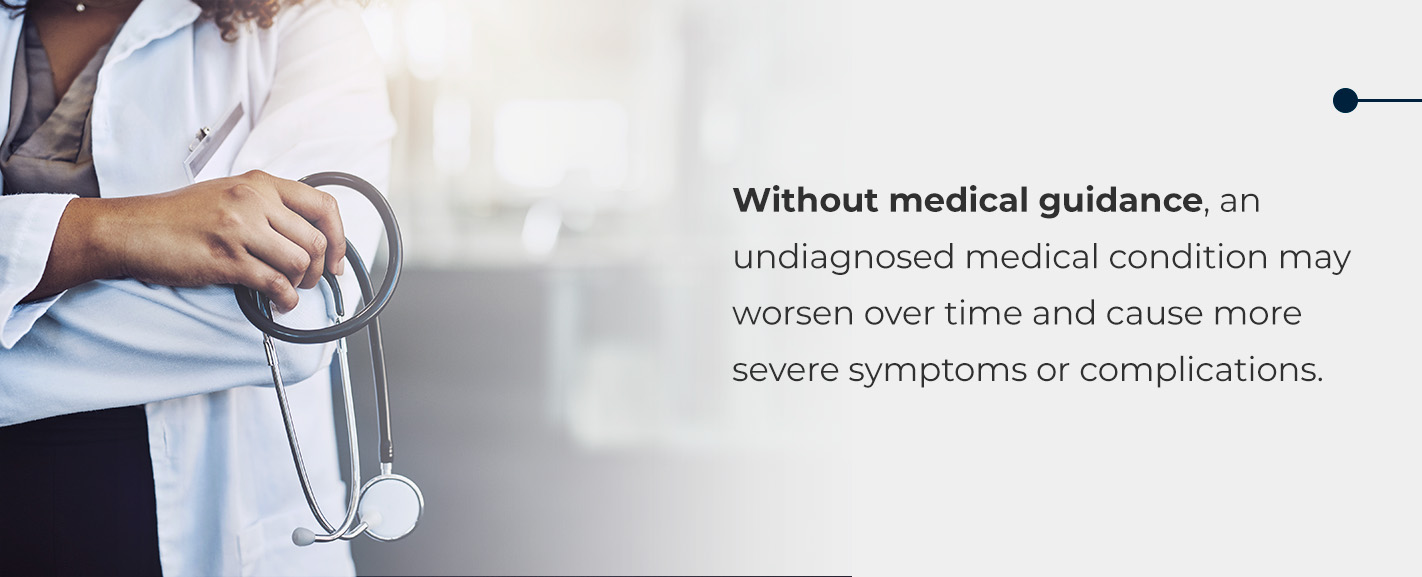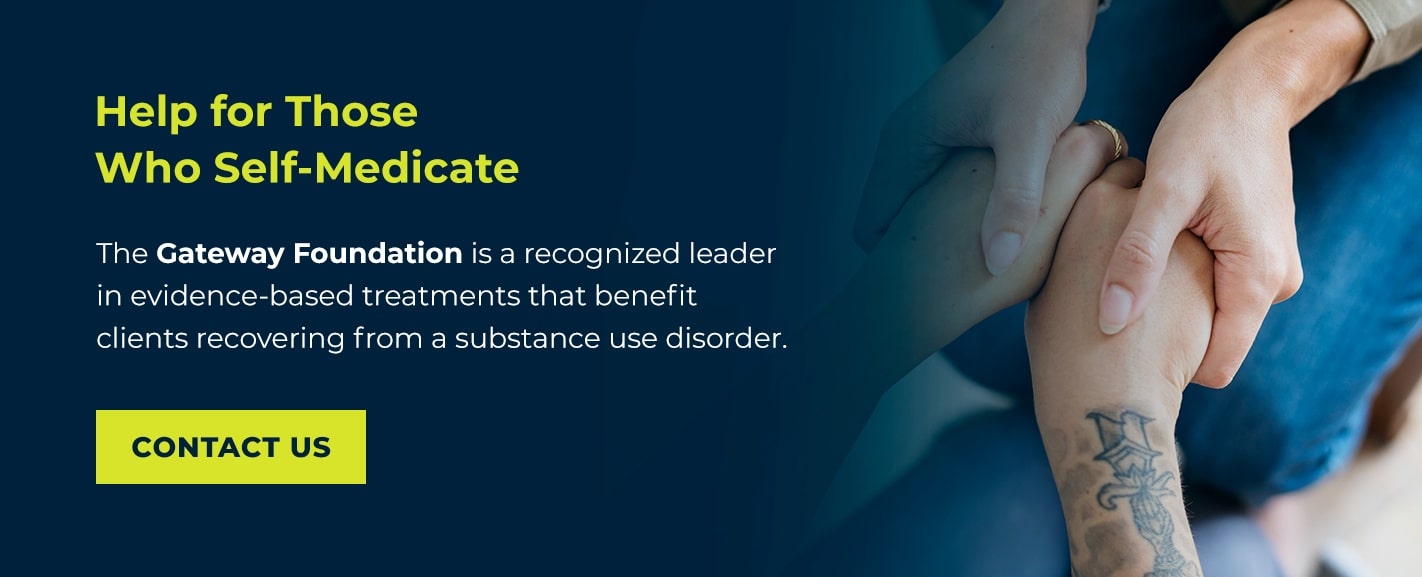- Nov 5
- Drug Addiction Treatment
Self-medicating with a prescription or over-the-counter medication or other substances can be dangerous. Before taking any medication, it is always best to talk to a medical professional and ensure that the drug is right for you. In some cases, the effects of self-medicating can lead to a dependence on the substance. In the most severe cases, self-medication can even increase your risk of medical complications or even death.
- What Is Self-Medication?
- Risks of Self-Medication
- Common Substances for Self-Medication
- Co-Occurring Disorders and Self-Medication
- Help for Those Who Self-Medicate
What Is Self-Medication?
Self-medication is when someone uses a substance to apply treatment for an illness, ailment or emotional state. Many people diagnose themselves with a medical or mental condition and proceed to self-medicate in hopes of improving their symptoms without seeing or speaking with a health professional. Taking medication without talking to a doctor can be dangerous and even lead to addiction or dependence on the substance.
While minor forms of self-medication, such as taking over-the-counter pain medicine for a headache, are typical occurrences, self-medicating can become dangerous if it progresses to harder substances or regular medication use without a doctor’s opinion. More severe dangers of self-medication can include someone who may begin to misuse prescription drugs or seek illegal substances as a coping mechanism.
Expired Medication
All medications have an expiration date that signals when people should use them for maximum effectiveness and safety. In some cases of self-medication, a person may take an expired substance without realizing it, and these can lower the medication’s potency and may increase the user’s risk of an adverse reaction. Self-medicating with expired medicines can be dangerous and cause you to receive the incorrect dosage to manage your symptoms.
In more severe cases, some medications cause a chemical reaction as they expire, which can be dangerous if consumed. As a medication changes in chemical composition due to age, it may become hazardous and cause a higher risk of adverse effects or react poorly with other medications you are taking. Before taking any medication, you should consult with a doctor first and ensure that the medicine is within a safe date range.
Antibiotic Misuse
Antibiotics are beneficial for treating harmful bacteria in the body. While these medications are very effective, you must take them under a medical professional’s guidance. Misusing or overusing antibiotics can cause bacteria and microbes to grow resistant to these medications, meaning that antibiotics are no longer effective against these microbes.
Treating antibiotic-resistant bacteria requires a higher dose of more potent antibiotics. With chronic antibiotic overuse, these bacteria may even become resistant to the strongest antibiotic medications available. When bacteria fail to respond to antibiotics, they can multiply quickly. Misusing antibiotics can lower their effectiveness and increase your risk of medical complications.
Inaccurate Doses
When self-medicating, it is possible to take an incorrect dose. A lower amount can be less effective and not provide the proper relief and symptom management. On the other hand, accidentally taking too much medication increases the risk of a potential overdose, which is extremely dangerous and life-threatening. Inaccurate doses can also increase your chance of experiencing negative medication interactions or side effects.
An incorrect prescription medication dosage can be much more dangerous than traditional over-the-counter medications and can lead to prescription medication addiction. Prescription medicine is for treating severe illnesses and pain. Misusing or taking improper amounts of any of these medications can be dangerous and increase your risk for medical complications, drug interactions and even an accidental overdose.
Undiagnosed Medical Conditions
In some cases, you may have an underlying medical condition or disorder that can negatively react with medication. Additionally, if you self-medicate to alleviate symptoms without consulting a doctor, you may be treating an underlying medical condition that you do not know you have. Without medical guidance, an undiagnosed medical condition may worsen over time and cause more severe symptoms or complications.
Risks of Self-Medication
Self-medicating can be dangerous and lead to several complications and poor health. Potential risks of self-medication include incorrectly self-diagnosing and taking the wrong medication. In some instances, dangerous drug interactions may occur due to incorrect dosage or medication misuse. To minimize potential risks, always seek a medical professional to provide an accurate diagnosis and prescribe medication.
- Substance misuse: When you take a medication without consulting a doctor or medical professional, you might choose the wrong drug. Additionally, self-medicating increases your risk of taking an incorrect dose or using drugs for longer than necessary.
- Substance dependency: If you take a substance for a prolonged period, your body may become dependent and need this substance to continue functioning correctly.
- Masking a medical condition: While you may think taking medication to alleviate symptoms is beneficial, it can often mask symptoms of an underlying medical condition. If you do not seek proper medical guidance, an underlying medical condition may worsen and become dangerous over time.
- Drug interactions: When you take multiple medications or combine medication with alcohol or substance use, you increase your risk of a negative drug interaction. When doctors prescribe medication, they can ensure that this medication will react safely with any other medications you take regularly.
- Medical complications: Misusing or overusing medication can increase your risk for severe medical complications. Taking too much medication or an incorrect medication can cause harmful symptoms, including nausea, convulsions and even death.
Common Substances for Self-Medication
People may use various substances to self-medicate, including over-the-counter medications and prescription drugs. In addition to traditional medicine, many people might also turn to drugs such as marijuana to manage their symptoms. Even legal substances, such as alcohol, can cause severe medical complications and dependencies when people misuse them.
Prescription Medication
People often misuse prescription medication to self-medicate. For example, someone experiencing pain or soreness may take a muscle relaxer or pain pill. While this may seem like a good idea, it can be hazardous. One of the dangers of self-medication is that when people regularly use these drugs without a doctor’s supervision, they may become dependent on them and form an addiction to prescription medication.
Alcohol
Many people may self-medicate using alcohol. In a mild situation, someone may have a drink to loosen up in a new social setting. In more severe cases, someone may use alcohol to try to dull feelings of depression or anxiety. Over time, this person may begin to drink more often and in more substantial amounts hoping to reduce negative feelings or emotions. In situations like this, you may develop a dependency on alcohol.
Marijuana
Marijuana is a substance many people use when self-medicating, as it is a popular psychoactive drug that may decrease feelings of stress or anxiety. While some may feel slight improvement when using marijuana, this is only temporary. Many people often feel the same negativity again once the effects of marijuana have worn off. Some people even develop a dependency on marijuana.
Co-Occurring Disorders and Self-Medication
Many people with a mental disorder, including depression, anxiety or PTSD, may self-medicate with prescription medication, alcohol or marijuana. A co-occurring disorder is when someone simultaneously has a mental illness alongside a substance use disorder. When a person with a mental health disorder attempts to self-medicate, they are at a higher risk of developing a substance use disorder. On average, 7.7 million adults have co-occurring mental and substance use disorders.
Help for Those Who Self-Medicate
The Gateway Foundation is a recognized leader in evidence-based treatments that benefit patients recovering from a substance use disorder. We take a holistic approach and use the latest practices, including therapy and medication in combination with empathetic engagement. Our techniques empower patients to fully recover and experience lifelong success. With a highly skilled team of addiction experts, we strive to provide customized and personalized treatments for people at any stage of recovery.
To learn more about our addiction treatments and counseling, contact us online today or call 877-381-6538.




